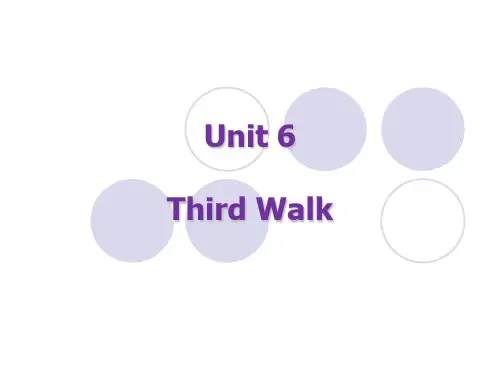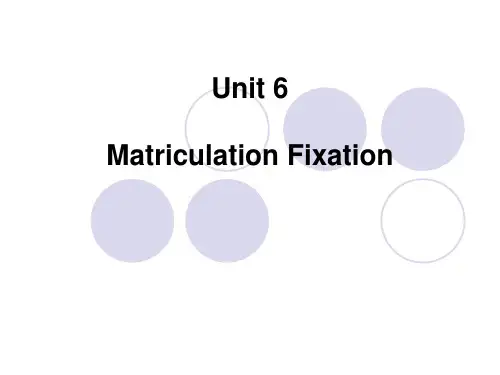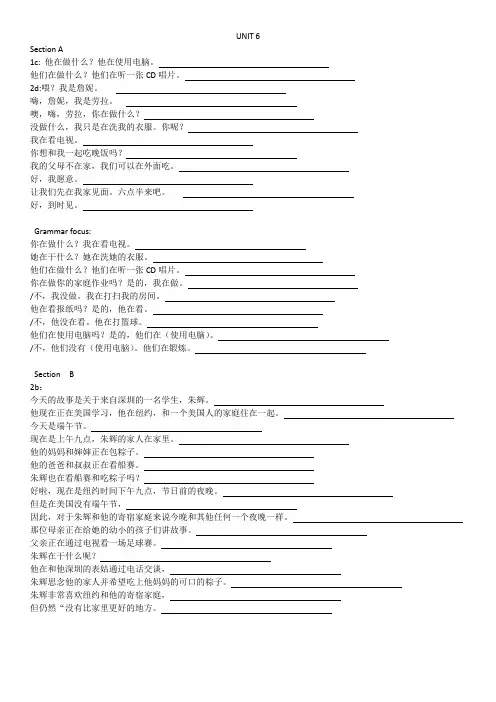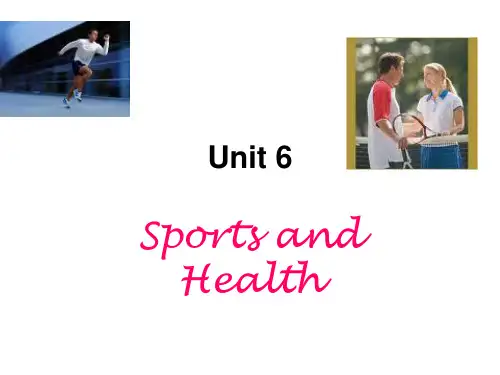Unit6
- 格式:doc
- 大小:70.00 KB
- 文档页数:7

Unit 6 How do you feel?Part A一、主要词汇①形容词:angry生气的afraid害怕的ill生病的worried担心的happy高兴的二、课文导入AHey, let’s have some popcorn.Yum! I ’m so happy. I love popcorn!Here you are.【1】I ’ll go and get some drinks. wait for me.【2】Hey, where is my popcorn?Yum! It was so good.What? How could you eat all the popcorn?!【3】We should share!Mum, if I feel angry, what should I do?【4】Well,first,take a deep breath.【5】Then you should count to ten.After that...?After that, you won’t feel so angry.Mum, I feel ill. Should I count to ten,too?No,dear,you should see a doctor.1、Here you are!给你!这是一个部分倒装的句子。
当句子以here,there,away等地点副词开头,且谓语动词是be动词,come,go等时,句子常用倒装结构。
①在倒装句中,如果主语是人称代词,则主语与谓语不倒装,构成“Here/there/away...+ 主语+ 谓语动词”部分倒装结构。
例句:Here we are!我们到了!Away he went!他离开了!②如果句子的主语为名词,句子常用完全倒装结构,即构成“here/there/away...+谓语动词+主语”结构。
例句:Here comes the bus!公共汽车来了There goes Mike!麦克走去那边了2、wait 等待;wait for sb/sth 等待某人/某物3、How could you eat all the popcorn?!你怎么能吃光所有的爆米花?!特殊疑问代词how:如何(方式),怎样(感受),怎么可以(质问)Could是can的过去式这是一个由how引导的含有情态动词could的特殊疑问句,其基本句型为:how could + sb + 动词原形+ 其他?;该句型意为“某人怎么能做某事呢?”,用于表示震惊、强烈反感或愤怒。





UNIT 6 Section A1c: 他在做什么?他在使用电脑。
他们在做什么?他们在听一张CD唱片。
2d:喂?我是詹妮。
嗨,詹妮,我是劳拉。
噢,嗨,劳拉,你在做什么?没做什么,我只是在洗我的衣服。
你呢?我在看电视。
你想和我一起吃晚饭吗?我的父母不在家,我们可以在外面吃。
好,我愿意。
让我们先在我家见面。
六点半来吧。
好,到时见。
Grammar focus:你在做什么?我在看电视。
她在干什么?她在洗她的衣服。
他们在做什么?他们在听一张CD唱片。
你在做你的家庭作业吗?是的,我在做。
/不,我没做。
我在打扫我的房间。
他在看报纸吗?是的,他在看。
/不,他没在看。
他在打篮球。
他们在使用电脑吗?是的,他们在(使用电脑)。
/不,他们没有(使用电脑)。
他们在锻炼。
Section B2b:今天的故事是关于来自深圳的一名学生,朱辉。
他现在正在美国学习,他在纽约,和一个美国人的家庭住在一起。
今天是端午节。
现在是上午九点,朱辉的家人在家里。
他的妈妈和婶婶正在包粽子。
他的爸爸和叔叔正在看船赛。
朱辉也在看船赛和吃粽子吗?好啦,现在是纽约时间下午九点,节日前的夜晚。
但是在美国没有端午节,因此,对于朱辉和他的寄宿家庭来说今晚和其他任何一个夜晚一样。
那位母亲正在给她的幼小的孩子们讲故事。
父亲正在通过电视看一场足球赛。
朱辉在干什么呢?他在和他深圳的表姑通过电话交谈,朱辉思念他的家人并希望吃上他妈妈的可口的粽子。
朱辉非常喜欢纽约和他的寄宿家庭,但仍然“没有比家里更好的地方。

高一英语Book2 Unit 6短语课文学案P. 62-641.惊恐地;害怕的2.加深了人们的固有印象3.害怕…4.由于…5.一种6.把…切断7.对…产生出乎意料地影响8.以…为基础9.偶遇可怕的一幕10.布满了…;覆盖了…11.把…看作12.而不是13.相反地14.从那天起15.错误地16.对…变得感兴趣17.保护它们免遭灭绝P. 65-671.提高…的意识2.致力于3.旨在4.参与5.对…产生消极影响6.阻止原始环境被破坏7.可再生能源8.温室效应9.有限的资源P.68-721.环保的2.淋浴3.…的大多数4.采取措施做…5.把…误当作6.分解7.高达…8.进入待机状态9.常识10.把…考虑在内11.依赖;依靠12.值得做13.意识到14.详细地15.呼吁某人做某事16.光盘行动17.督促某人做某事18.减少了…19.想出Part Two: SentenceP.62-631.She surfaces, cries _____________, then disappears forever.她挣扎着露出水面,发出惊恐的尖叫,然后就彻底消失了。
2.People have always_____________________ sharks, but Jaws made things worse.人们本就害怕鲨鱼,而电影《大白鲨》加深了这种恶劣印象.3.It made people __________________ sharks.它让人们对鲨鱼心生恐惧4.Some people stopped swimming in the sea, __________________________from the film.由于害怕可能遇上电影里描绘的这种可怕生物,有些人再也不敢去海里游泳了。
5.Fining is _______________fishing where sharks are caught and their fins_______________采割鱼鳍是一种渔猎活动,人们捕到鲨鱼后将鱼鳍割下。




1.A man saw Yu Gong and his children when they were working on moving the mountains.2.He told Yu Gong he could never do it because he was old and weak.3.As soon as the man finished talking, Yu Gong said that his family could continue to move the mountains after he died.4.Finally, a god was so moved by Yu Gong that he sent two gods to take the mountains away.5.This story reminds us that you can never know what’s possible unless you try to make it happen.Work on 从事于……Weak 虚弱的As soon as 一……就一般情况下若主句是将来时,从句用一般现在时表示将来I’ll write to you as soon as I get there.Mr. Chen doesn’t tell me when he_______. I’ll call you as soon as he_______.A.Will come; comesB.will come; will comeC. Comes; will comeD. Comes; comesGive up 放弃Give in 投降Give out 分发、散发(传单等)Give off 发出(光、热等)Give away 捐赠__________the train on time,they had to get up so early this morning.A.CatchB. To catchC. CatchingD. Caught。
1 Unit 6Text A The British Educational System 英国的教育体系 All over the world,the mention of English education suggests a picture of“public schools”, 一提起英国教育呈现在人们面前的往往是一幅“公学”的画面,and it suggests in particular the names of certain very famous instructions—Eton,Oxford and Cambridge;特别是一些著名的教育机构——伊顿、牛津、剑桥等;but People do not always realize what place these institutions occupy in the who1e educational system.但是人们往往不了解这些机构在英国整个教育体系中所占的位置。Oxford and Cambridge are universities each haying about 12,000 students out of a total of over 250,000 students at all British universities.牛津和剑桥两所大学分别拥有大约12 000在校生,而全英在校大学生的总数超过250 000。Eton is a public school,and the best known of the public schools.伊顿是所公学,也是最著名的公学。which,in spite of their name,are not really public at all,尽管名字叫公学,其实并不是真正意义上的公立学校, but independent and private secondary schools taking boys from the age thirteen to eighteen years.而是所独立的私立中学。它只招收13-18岁的男孩。The public schools in reality form a very small part of the whole system of secondary education;实际上,公学仅仅是英国整个中学教育体系中的一小部分;only about one out of forty English boys goes to a public school,and one out of 1,500 goes to Eton.在英国仅有1/40的男孩能进入公学读书,而1 500个中只有1个能上伊顿公学。 Apart from the so-called public schools there is a complete system of state primary and secondary education.除了所谓的公学之外,英国还有一套完整的国立小学、中学教育体系,which resembles in general the state education in most other countries.这同大部分国家的国立教育大体相似。A11 children must, by law , receive fulltime education between the ages of five and sixteen.法律规定所有5~16岁的孩子必须接受全日制教育,Any child may attend,without paying fees, a school provided by the public authorities, and the great majority attend such schools.任何孩子都可免费到由政府当局开办的学校读书。They may continue,still without paying fees,until they are eighteen.大部分孩子都上这类学校,并且可以一直读到18岁。In presenting an overall picture of English education it would be reasonable to concentrate on the state system alone and refer briefly to the public schools.要全面介绍英国的教育,应单独集中介绍其国立教育体系,同时简要介绍其公学教育。However,a1though the public schools are not important numerically,然而,尽管从数量上讲公学所占的地位不算重要,they have been England’s most peculiar and characteristic contribution to educational methods and they have an immense influence on the whole educational practice and on the English social structure.但它对英国的教育方法做出了最特殊、最具特色的贡献,对整个英国的教育实践和社会结构产生了重大的影响。For a hundred years most men in leading positions in banking ,insurance ,high finance,some industries ,the army,the church 2
and conservative politics have been educated at public schools.近百年来在银行、保险、高级金融、工业、军队、宗教、保守政见等领域的顶尖人才大都曾在公学接受过教育。Things are beginning to change but it will take time.尽管近来情况开始有所变化,但短时间内变化还不明显。Among the universities Oxford and Cambridge hold a dominant position.牛津大学和剑桥大学在大学教育领域处于领先地位。Of cabinet ministers who went to universities,nearly all went to one or the other of these two,and to Oxford in particular.读过大学的内阁大臣中几乎都上过这两所大学中的某一所,特别是牛津大学。 A student who receives further full—time education after the age of eighteen, either at a university or at a teacher’s training college or at some other college giving training of a special type,can usually receive a grant from the public authorities to cover his expenses,or most of them,unless his parents have a large income.学生满18岁后,若要进一步接受全日制教育,可以选择读综合性大学、教师训练学院或者其他提供专门培训的学院。政府当局通常可以提供给学生助学金以支付其全部或大部分学费,除非学生的父母收人很高不需要资助。But the number of young people who can enter universities is limited by the capacity of universities, which is less than enough to take all the young people who have the basic qualifications for university admission.但是由于受到大学容量的限制,上大学的青年人的数量是有限的,这些大学的数量不能容纳下所有具备基本入学资格的学生。In practice,therefore,entry to universities is competitive.因此实事上,上大学是有竞争性的。But university degree courses are also available at polytechnics,and entry to the Open University is less restricted.但是学生还可能选择上工科学院的学位课程,而且上函授大学所受限制则小得多。 The academic year begins after the summer holidays and is divided into three“terms”. 每学年的开始从暑假后的学期算,并且分为三个“学期”, with the intervals between them formed by the Christmas and Easter holidays.由圣诞节、复活节两个假期间隔开来。The exact dates of the holidays vary from area to area.各学校的具体放假时间因地区差异而不同,being in general about two weeks at Christmas and Easter,大致上圣诞节、复活节各两周的假,plus often a week or more at Whitsun,and six weeks in the summer,beginning rather late.加上通常一周或更长一点的圣灵降临节假期和六周的暑假,暑假开始得相当晚。Schools outside the state system decide on their own holiday dates,不受国家教育体制限制的学校自行决定放假时间,generally taking a month off at Christmas and Easter and eight weeks in the summer .通常是圣诞节、复活节各放一个月,暑假放八周。The three terms are not everywhere called by the same names;这三个学期在不同的地区叫法不完全一样。indeed some schools call the January—March period“the Spring Term”, 实际上一些学校称一至三月学期为“春季学期”,others use“Spring Term”for the period April—July.另外一个称呼是称四至七月学期为“春季期”。Some call the January term“Winter term”(which is